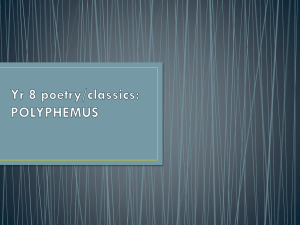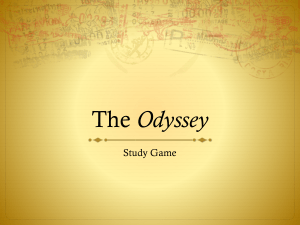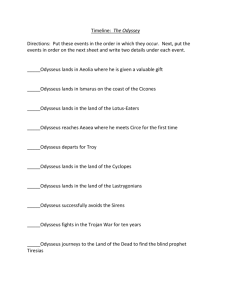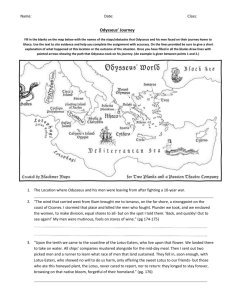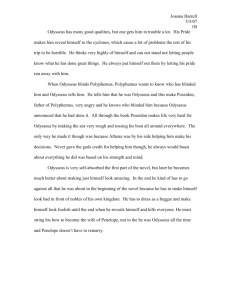notes - ourladys
advertisement
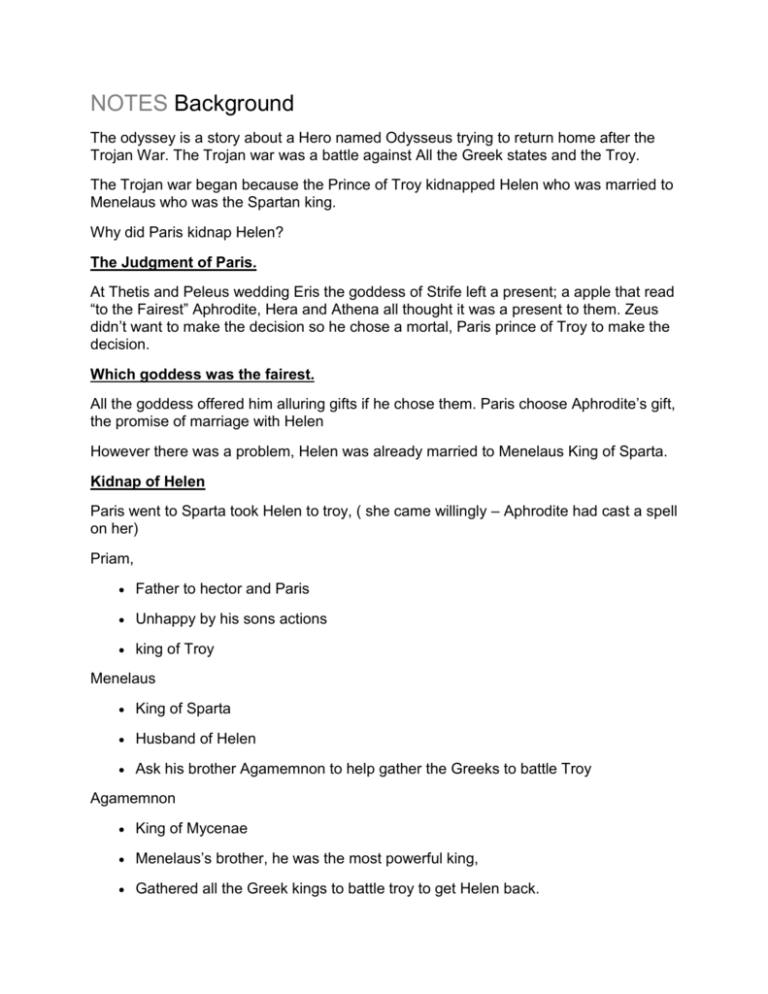
NOTES Background The odyssey is a story about a Hero named Odysseus trying to return home after the Trojan War. The Trojan war was a battle against All the Greek states and the Troy. The Trojan war began because the Prince of Troy kidnapped Helen who was married to Menelaus who was the Spartan king. Why did Paris kidnap Helen? The Judgment of Paris. At Thetis and Peleus wedding Eris the goddess of Strife left a present; a apple that read “to the Fairest” Aphrodite, Hera and Athena all thought it was a present to them. Zeus didn’t want to make the decision so he chose a mortal, Paris prince of Troy to make the decision. Which goddess was the fairest. All the goddess offered him alluring gifts if he chose them. Paris choose Aphrodite’s gift, the promise of marriage with Helen However there was a problem, Helen was already married to Menelaus King of Sparta. Kidnap of Helen Paris went to Sparta took Helen to troy, ( she came willingly – Aphrodite had cast a spell on her) Priam, Father to hector and Paris Unhappy by his sons actions king of Troy Menelaus King of Sparta Husband of Helen Ask his brother Agamemnon to help gather the Greeks to battle Troy Agamemnon King of Mycenae Menelaus’s brother, he was the most powerful king, Gathered all the Greek kings to battle troy to get Helen back. At the beginning of Book nine of the Odyssey ( Od.) is close to home. He is about to recount the story of what happened to him after he left Troy and tried to return home to his family. 1. King Alcinous has invited him into his kingdom, after they finished eating the king ask him to reveal who he is and what is his story. NOTES King Alcinous: Is the Phaeacian king. Bard: Singing to the Lyre. The Od. would have been originally sang or recited by a bard. Stratagems: a clever ruse or scheme that is designed to deceive others or achieve a goal. QEUSTION: What would Odysseus stratagem have been? Pronuciation Zacynthus: zuh-kin-thuh Dulichium: dyoo-LEE-kee-um 2. (9.19-30.) Odysseus introduces himself. Says his name, his father’s name and that land he is from – Ithica. He talks about how proud he is of his country. NOTES Odysseus's revelation of his identity is important to note. It represents the cultural values of ancient Greece. Odysseus doesn't simply utter his name; rather, he explains who his father is (“Laertes's son”), and gives a reference to his homeland (“who makes his home in Ithaca”) (9.561–562). This manner of introduction was very formalized and formulaic in Homeric Greece a. Odysseus is here going through the motions of confirming his kleos (the glory or renown that one earns in the eyes of others by performing great deeds). He wants to make sure that people know that he was the one who blinded Polyphemus, explicitly instructing Polyphemus to make others aware of his act. Like the heroes of the Iliad, Odysseus believes that the height of glory is achieved by spreading his name abroad through great deeds Readers should not confuse Odysseus’ pride in identifying himself to the Phaeacian hosts with vanity. One’s name and reputation are crucial in the Homeric world. When Odysseus states that his “fame has reached the skies” (9.22), he is merely stating fact, identifying himself. Reputation is of paramount importance in this culture. But his pride in his name foreshadows Odysseus’ questionable judgment in identifying himself during the escape from Polyphemus. 3. (9.30) Calpso and Circe wanted tried to keep Od. from his homeland. He is saying here that never once did he forget about his home or his family. 4. He begins his story from the beginning. He has just left troy. ( 9.39) ‘The same winds that wafted me from Ilium brought me to Ismarus, the city of the Cicones’ Ilium: Latin for Troy. 5. Od. explains that winds sent him from Troy to Ismarus where people called the Cicones lived. Cicones: a Thracian tribe on the coast of Thrace, They fought in the Trojan war on the side of the Trojans. . 6. (9.29-9.61) Sacked the city of the Cicones, Od wanted to leave but the men had plenty of wine and food to eat. Partied hard. Od. Shown as sensible, good leader, his men foolish. (9.58) ‘The time when the ploughman unyokes his ox’ = dusk NOTES Strong-greaved: armour that Greek soliders wore on their shins. Pronuciation Greeks Achaean: uh-kee-uhn, Danaans: dan-ee-uhn , Argive: Arjive The Cicones or Ciconians: were a Thracian tribe, whose stronghold in the time of Odysseus was the city of Ismara (or Ismarus), located at the foot of mount Ismara, on the south coast of Thrace. They are mentioned in book two of the Iliad as having joined the war on the side of the Trojans, being led by Euphemos. In book nine of the Odyssey written by Homer, Odysseus and his men take Ismara by surprise and slay most of the Ciconian men they come across, while burning Ciconian towns and taking Ciconian women but later Ciconian reinforcements arrive and attack the invading Achaeans, slaying so many of them that Odysseus and his men are forced to flee in their ships, with the numbers of their shipmates greatly reduced. 7. Six of Od. Men were killed by Cicones. They fled Ismarus, as they fled they gave a ritual call to honour those that died. Notes Moral Dimensions – We should disagree with Od actions, they were to cavalier and his men partied afterwards to long. Some scholars suggest that Odysseus raids Ismarus because the Cicones are allies of the Trojans. Odysseus’ men’s foolish disregard for his advice. Having gained victory and considerable plunder, Odysseus wants to be on his way. His men, on the other hand, drink and feast as the Cicones gather reinforcements, skilled warriors who eventually rout the Greeks. Odysseus loses six men from each of his ships and is lucky to get away by sea. 8. Zeus sends a storm. Ships battered, had to row their ships to land. 9. Rested for two days – by third they could restore the mast and continue. If they had good conditions they would have made it home, however the swell, the current and the wind blew him of course. 10. They drifted past Cythera, An island of southern Greece in the Mediterranean Sea south of the Peloponnesus. Southernmost of the Ionian Islands, it was the chief center for the worship of Aphrodite. 11. Drifted for nine days because of the winds 12. Arrived at the Lotus Eaters, on the coast of north Africa. Eat, drunk then men went exploring. Found the lotus eaters –given fruit that makes you forget , they forgot about home. Od. Was forced to drag them back and speed of. Themes: Temptation-Resistance. The lure of oblivion through drugs. Forgetting home. 13. Left Africa and sailed to the land of the Cyclopes. NOTES Cyclopes: Mythological monsters , One eye on their foreheads Polyphemus : uncivilised – polar opposite of the lotus eaters. Themes Civilised versus noncivilised - The one-eyed giants are barbaric. Fortunately for them, their homeland is so lush that they need not cultivate crops. Although they are effective herdsmen, they have no interest in the usual trappings of civilization. Polyphemus and his fellow brutes have no laws, no councils, and no traditions of civility or hospitality. When Odysseus’ curiosity leads him to Polyphemus’ cave, his men want to raid it and leave. Odysseus insists on staying to try the hospitality of the owner, a decision that ultimately results in the death of several of his men 14. They are on a Island with goats and fresh water. Sit and drink wine that they stole from the cincones and eat goats meat. They can see the cyclopes island. It is on a neighbouring island. (9.170-) Od. Is curious. They could have been on their way, but Od. Wants to find out what sort of men they are. (9.176) Hawser = Rope Man who eats bread= civilised 15. Od. Set of to the cave of the cyclopes. Brings with home wine which had been given to him Maron, son of Euanthes. He was a priest to Apollo on Ismarus, where the cicones lived.Od had speared him and his familys life when they sacked the city out of respect for his postion as priest. In return he had received gifts of unmixed wine. It was very strong, one cup of wine would be mixed with twenty parts water. (9.220-221) ‘occasions when abstinence had no charm’ Tutelary = Protector god of. Eg. Apollo was the god that protected Ismarus, the city of the Cicones . 16. Goes into the cave. Sees cheese, whey, all the animals. His men want to steal the food but Od. Want to wait and meet the cyclopes to see if receives the food as a gift. NOTE The big rock at the door- massive The care that he gives his animals. Achaean means Greeks 17. (9.258-65) Recounts his Trojans past to Cyclopes NOTE Ilium=troy (9.266) Suppliants at your knees :A humble petitioner; in ancient Greece it was customary for a suppliant to kneel and grasp the knees of the person from which mercy or favours were desired. 18. (9.166-71) Wants gift of hospitality NOTE Every society has certain rules, expectations and customs that comprise what we call culture, and an effective way of reinforcing these cultural ideas is through the religion of that culture. A "law" has much more weight when there is the power and influence (or threat of punishment) of the gods behind it. In ancient Greece, one never knew when the beggar knocking at the door might be a god, disguised or else watching from above, passing judgment. Therefore, hospitality toward strangers and travellers was a popular element in many of the myths and stories We see here that those who were being entertained could have expected to be provided with food, a comfortable place to sit, charming company and acceptance into the day's activities. Since the traveler would not usually be wandering out of his home into the dangers of the world, it was assumed he was on some sort of mission. The host then is expected to be able to provide some sort of assistance. Zeus is the champion of the suppliants and guests- Zeus being the god of hospitality, one of the primary ways to worship this aspect of Zeus' godliness was to be hospitable to strangers and travellers. 19. The Cyclops responds by saying that he cares nothing for the gods.because he believes he is much stronger then them. His father is posidon, zeus is his uncle. He would never do anything for Od. And his men out of fear of the gods, he would only if he felt like it. Find the line reference for the following 20. The Cyclopes wants to find out where his ship is so he can destroy it, Od. Is cleverer and sees the Cyclopes ploy. ______________ 21. Cyclopes grabbed Od.s men and smashed their heads onto the floor, washed it down with milk then went to sleep.___________________ 22. Od. was going to kill him but realised they were trapped because of the big rock covering the entranceway._________________ 23. Ate more men.__________________ 24. Had to think of a plan – Prayed to Athene, goddess of wisdom for help. __________ 25. Sharpened a piece of wood.__________________ 26. Came back, ate more men – Od offered the Cyclopes some of the wine that he had been given in Ismara. He drinks three bowls. Ask Od. His name, Od says his name is Nobody NOTE Nobody: what does this tell us about the character of Od.? Play on words, note the Cyclopes reply. Said he will eat nobody last, that is his gift. Cyclopes drunk, Od heats the stick till its hot and stabbed it into his eye. Other Cyclopes heated is screams and came running, when they ask what what’s wrong with him he replied.( 9.408-9) ‘its nobodys treachery, not violence that is doing me to death’. Joke. If noboby is hurting you then you must be sick, this is in gods hands so there is nothing we can do. We can only pray to your father posidon. 27. Cyclopes tried to capture od. And his men, but Od. Smarter then that. Desperate for a plan. 28. Od. And his men put sheep on their backsPut the sheep on their backs. 29. Cyclopes open the cave to allow the sheep out to the pastures. – The cyclopes pattered each sheep as they passed him even though he was blind and in agony. Pathetic and pitiful site, speaks to his ram which Od. is hiding under. Sheep are his only friends, like children carefully tends them Od. Blinds P. Then steals his only friends! He then makes fatal mistake: He boast of his deed. 30. (9.473-9) Cyclopes devoured his guest, complete opposite of what you should do, Od says that what has happened to him is punishment for this from the gods 31. (9.496-7)M en were angry at Od. For provoking the cyclopes. Why make things worse, we are nearly away. But Od. Was all flared up, couldn’t control himself. And made fatal mistake, he reveals himself to the cyclopes – BIG MISTAKE. 32. (9.505-21) Cyclopes reveals that there had been a prophecy given by Telemus, so of Eurymus who had lived among the cyclopes. A man named Od. Would rob him of his sight. – expected a tough man more muscle, but Od is all brains. (9.517-21) Sarcastic – My father will help you, give you some gifts. 33. Keeps provoking the Cyclopes Prays to his father. Don’t let O. Return to his home in Ithica. (9.530-4) If he is destined to return home, let it be late, in wretched plight having lost everyone and everything and to return to trouble at home. 34. (9.551) Sacrificed the Cyclopes ram to Zeus, however Od. Thinks he takes no notice because of what happens.
